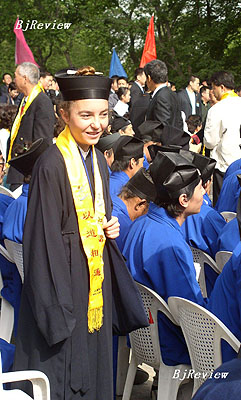 |
|
EASTERN WISDOM: Karine Martin at a Taoist gathering dressed in a traditional costume of the religion (LI LI) |
When people see 35-year-old Karine Martin walking through the streets of Shaanxi Province's Xi'an City, her blonde hair held in a bun atop her head, wearing a dark Taoist robe, she is often mistaken for an actor in the middle of a movie shoot. Her dress style is reminiscent of countless scenes from kungfu movies set in China.
In fact Martin, an ordained priest of Qinghua Temple in a suburb of Xi'an, is performing yunyou, literally translated as traveling like a cloud, one of her favorite Taoist practices.
The French-born former neuroscientist has traveled a long way in her pursuit of a different way of life, both physically and mentally.
In 1998 Martin, who holds a doctorate in neuroscience, landed a job as a lab scientist in London with the multinational pharmaceutical company Merck Sharp & Dohme. Leading a regular urban woman's life, she spent a large portion of her salary on stylish clothes and shoes, frequented parties, went to gym regularly to stay in shape, as well as had a car and a boyfriend.
At that time Martin was a rational thinking scientist, who had never had faith in any religion or questioned her life. That all changed, almost overnight, when she accompanied a colleague to a Taoist meditation class, an event that changed the course of Martin's life.
While she learned about Taoism, an indigenous Chinese religion, for the first time at the meditation class, she felt that a new way of looking at the world had been opened to her. From then on she became less interested in science and increasingly interested in Taoism and meditation. She also became convinced Taoism offers better tools to study the human brain than a microscope.
Martin's conversion to Taoism did not stop at seeking new tools for her research. In 2001 she made her first trip to China, which involved visits to a number of Taoist temples. When she stepped into a Taoist temple for the first time on that trip she felt uneasy with the worship rituals of burning incense and kowtowing to statues, actions she felt then were nothing but superstition. But later on the trip Martin experienced a revelation that changed her mind, during a visit to another temple. "When I stepped into the temple, I sensed something very powerful and beautiful," she said. "Right there I decided to dedicate my life to be a Taoist priest."
According to Martin, the lure of Taoism lies in its focus on harmony and peaceful coexistence. "Taoism is all about harmony, peace and being contented with whatever you have," she told Beijing Review at an international forum on Taoist classic Daodejing in Xi'an, Shaanxi Province, in April.
With the differences between the rich and the poor, between religious beliefs, and between different nationalities, there is a profound need for harmony in the world today, according to Martin, who assumed the role of director of the French Taoist Association in 2004.
In 2002 Martin was ordained as a priest in Xi'an, but it was not until 2005 that she finally left her lucrative career and concerned family to move to China where she could study Taoist classics and the Chinese language.
Totally abandoning her neuroscience studies, Martin now considers Taoism a way of life. She also believes that science and religion, instead of contradicting each other, can help each other. Citing an example, she said neuroscientists have tried to study a totally different brain wave found in Buddhists and Taoists during meditation in order to better understand how the human brain works.
Despite the upheavals to her life Martin has no regrets about following Taoism. She follows the three dos of Taoism-respect your teacher, the scripture, and the Tao, as well as the five don'ts-don't kill, don't tell lies, don't steal, don't have too much sex, and don't drink too much. There is just one thing she really misses from her secular life, said Martin, and that is cheese. "China doesn't have a large variety of cheese," she said with a grin.
The most difficult part of following Taoism for Martin is studying Taoist classics, most of which were written more than 2,000 years ago, in language that is difficult for many Chinese people to understand. Yet Martin believes all her efforts will be worthwhile as she trains herself to be a qualified preacher of Taoism to Western society.
"Now more and more foreigners are interested in Taoism, we need an accurate translation of Daodejing, the Taoist classic," said Martin, who complained that among hundreds of versions of Daodejing in different languages, too few accurately convey the philosophy of Taoism. Unlike translations of the Bible, which have mainly been church-motivated for the purpose of spreading the religion, some translators of Daodejing have been foreigners who did not possess a deep understanding of the religion and in some cases had never been to China.
Martin would like to spread the philosophy of Taoism to its followers in France when she has further mastered the religion, but as for returning to her home country she is unsure.
"Let's see what destiny brings me," she said, a very Taoist answer. | 